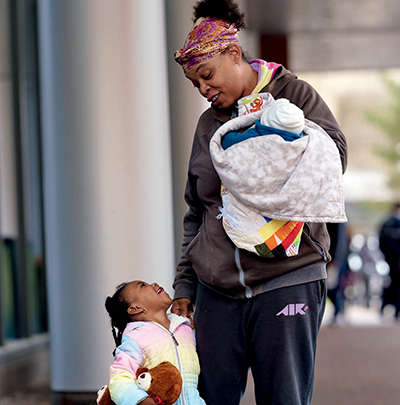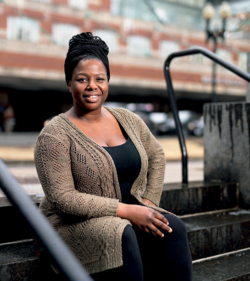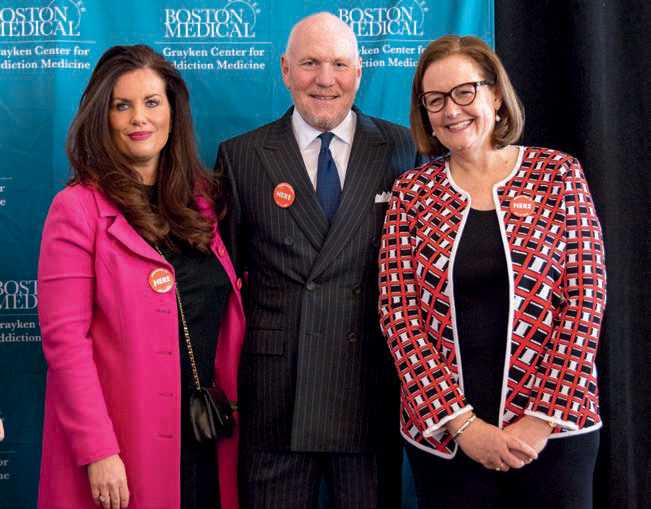
Shakeia remembers the days when she would wake up thinking only about her first drink. Alcohol was a coping mechanism, a way to numb the abuse she endured as a child and losing her own children to the foster care system. Compassionate care at the Grayken Center made all the difference for her and her youngest daughters, Arie (left) and Milan (right). This fall, Shakeia is three years sober.
Every time she counsels someone like Shakeia, a person seeking recovery from a substance use disorder, BMC recovery coach Phaedra Moore reflects on the two lives she lived during her own pregnancy. To others, she was successful—holding a diploma from George Washington University, newly married, and expecting her first baby. Behind closed doors, she was addicted to heroin and desperate to numb the pain of losing her mother. When it came time for her delivery at another local hospital, she was terrified that her two lives would finally collide. Moore was relieved when her daughter was born healthy and without signs of opioid dependence, but also fearful.
“When we got in the car with her, I was looking back to see if anybody from the hospital was chasing us saying, ‘wait a minute!’ And it was a relief that nothing happened. But also, nothing happened. So, I kept using for the next seven years before I went into treatment,” she recalls.
Today, Moore works as a recovery coach in Project RESPECT, a first-of-its-kind OB/GYN program specializing in the care of pregnant persons with substance use disorder. Recovery coaching is one of the many new tools the Grayken Center of Addiction uses to support patients as they navigate the complexity of addiction.
“When I was pregnant, I wish I had someone sit across from me and say what I say now to my own clients, that ‘I know this is scary, that it’s hard going through involvement with DCF (Department of Children and Families) and having everybody scrutinize you. It sucks. But you know what? Recovery is possible. I’m living proof of that. And we are here to help you find a way to save your life,’” explains Moore.

Phaedra Moore, recovery coach with Project RESPECT
A Game-Changing Approach
Since the explosion of addictive opioid prescriptions in the mid-90s, the opioid epidemic in America has taken many guises. Oxycodone, heroin, and now, lethally potent fentanyl-laced drugs are fueling overdose deaths at record rates. In Massachusetts, communities have been ravaged, with overdose mortality rates nearly double the national average. Yet victims remain in the shadows, sometimes paralyzed by shame, uncertain of how to pursue limited and fragmented treatment options.
Founded five years ago through a historic $25 million gift from Eilene and John Grayken, the Grayken Center for Addiction is working to change all of that. The Center is a hub of innovation—encompassing 10 leading addiction medicine programs, where experts provide lifesaving care. Discoveries made here propel research and inform best-in-class clinical education worldwide.
“The Grayken gift created an unshakeable foundation for our work to offer people a range of services and safety not found anywhere else,” says Miriam Komaromy, MD, FACP, medical director of the Center. “Our commitment to evidence-based solutions means progress is measured and evaluated. What we are learning here in Boston will be used to inform the treatment of patients everywhere.”
Meeting Patients Where They Are
Shakeia’s own journey to recovery came in an unlikely package: the birth of her now 3-year-old daughter, Arie, at BMC. Shakeia’s social worker knew she was struggling with addiction and urged her to enroll in Project Promise, a day-treatment program serving pregnant and parenting people and their children. The counseling she received was transformative. Celebrating three years sober, Shakeia and her two youngest daughters, Arie and Milan, now receive care from Sara Stulac, MD, at Supporting Our Families through Addiction and Recovery, a pediatric clinic designed to help parents maintain their recovery while providing comprehensive pediatric care to their children.
Shakeia’s treatment for substance use disorder embodies the Grayken care model: accessible entry points to addiction treatment across the health system and compassionate, non-judgmental, effective care. Grayken experts are constantly innovating to reduce barriers for people seeking specialized medical support, including broadening outreach to people with active substance use disorders who aren’t in care. Expanding the distribution and trained use of naloxone—a medicine that can quickly reverse overdoses—is another valuable tool to fight the overdose crisis.
“People with opioid use disorder must survive to get better. Naloxone keeps people alive and gives them a chance. By preventing overdoses through naloxone, we buy more time for people who don’t have the means to stop or aren’t ready to stop,” explains Alexander Walley, MD, MSc, researcher and Grayken Center for Addiction medical fellowship director.
“The Grayken Center is helping us to connect a network of services and people willing to say yes—to show up for our patients…”
—JESSICA TAYLOR, MD, FASTER PATHS MEDICAL DIRECTOR
“While they continue to use, we need to keep them as safe as possible. We know certain strategies are effective in addressing the opioid crisis. Naloxone is one of them.”
Walley helped draft a new state policy allowing for any Massachusetts pharmacist to hand out a naloxone rescue kit on the spot, eliminating the need for a naloxone prescription. While Walley and his colleagues ultimately hope that naloxone becomes available over the counter, this policy is a critical first step in making rescue kits more widely available to save more lives.
Lifesaving Innovations to Long-Term Recovery
Another example of pioneering care is BMC’s low-barrier clinic, Faster Paths. Working closely with the Emergency Department, the clinic welcomes patients walking in from the street seeking acute treatment for opioid use disorder. Jessica Taylor, MD, Faster Paths medical director, emphasizes the importance of developing patient-centered care in an ever-changing opioid crisis. With the recent influx of fentanyl in the opioid supply escalating overdoses, the common medication for opioid use disorder, buprenorphine, is becoming less effective in managing withdrawal compared to methadone. But timely access to methadone is limited to highly regulated clinics, often with limited hours and long wait times. In the spring of 2021, Taylor and her colleagues knew they had to do something to care for patients and improve their chances of engaging in long-term treatment.
A federal guideline called the “72-hour rule” permits the use of methadone as an emergency treatment for patients for up to three days. Yet the rule is rarely implemented outside of emergency department settings. After the team addressed regulatory considerations, Faster Paths became the first known outpatient clinic in the nation to offer methadone to patients under the rule. It is now an essential tool to help the clinic’s sickest patients take the next step to ongoing care and further prevent overdoses in Massachusetts.
“The Grayken Center is helping us connect a network of services and people willing to say yes—to show up for our patients, offer flexibility, and do whatever needs to be done on a given day to provide the care people need—it’s hard to convey just how unbelievably important that is,” says Taylor.

Eilene and John Grayken, above with BMC CEO Kate Walsh, established the Grayken Center for Addiction at BMC in 2017 with a historic $25 million gift to the hospital. Addiction medicine specialists throughout BMC are inspired by Eilene Grayken’s vision to “do the most good for the most people.”
Sharing Knowledge Around the World
According to the Association of American Medical Colleges, of the 21 million Americans with substance use disorders, there are only 3,000 physicians certified in the country to treat them. To have a powerful impact on the opioid crisis, it is a national imperative to train more leaders in the field.
The Grayken Center is nationally recognized for the quality and depth of training in addiction medicine. An academic medical center where 17 percent of admitted patients have an active substance use disorder, physicians-in-training can immerse themselves in the Center’s most advanced care management methods and contribute to impactful research. Beyond the Center’s Addiction Medicine Fellowship, Grayken offers subspecialty training for addiction in psychiatry, obstetrics and gynecology, emergency medicine, and nursing. Of the 21 graduates of the program in medicine, nine have stayed to grow innovative programs at BMC, while the remainder are leading programs throughout the country.
Doctors alone cannot shoulder the demand for addiction services. When clinicians across the country want to educate and train their teams, Grayken’s Center for Addiction Training and Technical Assistance is here to help. Developed and led by Colleen LaBelle, MSN, RN-BC, CARN, Grayken Center director of innovation, the program is a unique model of care that empowers nurse care managers to take a lead role in treating substance use disorders. Significantly boosting access to lifesaving medications, the program has spread to community health centers throughout the state and is now known as the “Massachusetts Model.” The Grayken Center provides education and tools to help hospitals institute similar programs. In 2021 alone, the program trained 14,000 individuals and 54,000 people across 50 states, and 153 countries accessed addiction education on the website.
Evolving Care to Meet the Changing Crisis
The steep rise in overdose deaths during the COVID-19 pandemic and the shifting demographics of people impacted by the crisis means the health system must continue to address the opioid epidemic from all angles. The Grayken Center remains on the frontlines, responding to the changing needs of our community. From partnering with the city of Boston to address the addiction, mental health, and homelessness crisis at Mass and Cass to advocating for safe consumption sites that reduce overdose risk, BMC is working to reduce stigma so that people feel safe asking for help as they would with any other medical illness. It’s that level of safety that recovery coach Phaedra Moore wishes she had felt 10 years ago when her daughter was born. Three years into her own recovery, she feels her strongest role is helping to open the door to addiction care for others in need.
“I get to be a part of an incredible support network we are able to put around our patients. I am also coming home every day and not picking up a drink or drug because I have a job to do, and I have a place to go that recognizes the value I can bring to the table. The Graykens’ gift is like tipping the first domino. It goes so far and touches so many people in ways they don’t even realize. It’s an incredible thing to be a part of,” she says.
To make your own gift to support BMC, donate online.